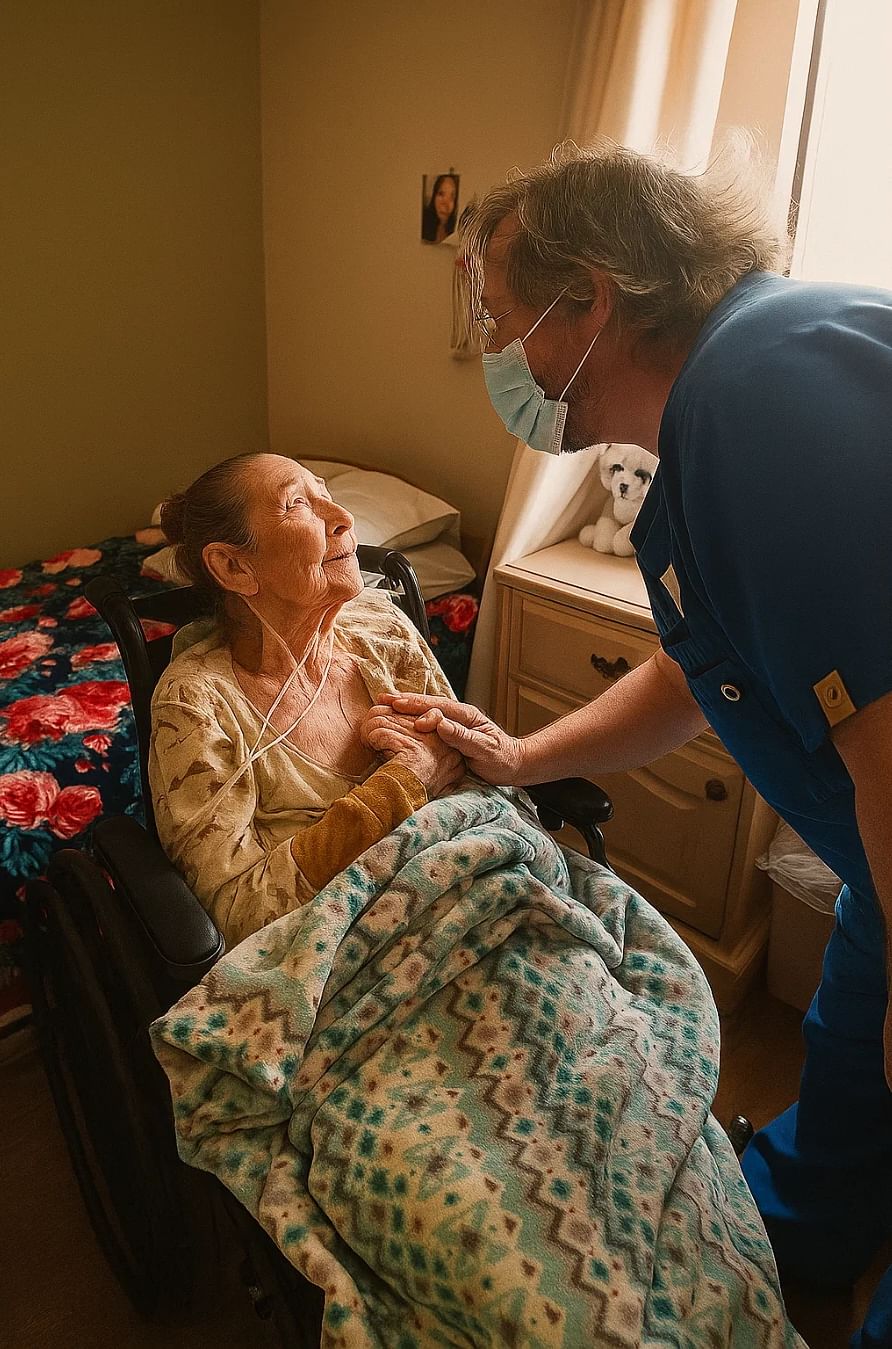Comfort Care Explained: A Guide to Pain Management and Support
When someone is facing a life-limiting illness, the conversation often shifts from curative treatments to a focus on comfort and quality of life. That is where comfort care comes in. Also known as palliative care or supportive care, comfort care provides relief from pain and distressing symptoms while supporting patients and their families through emotional, spiritual, and practical challenges. At Anvoi Hospice, we believe that everyone deserves to feel safe, supported, and comfortable throughout their healthcare journey, especially at the most vulnerable times.
This guide helps to explain what comfort care means, how it works, and the ways it helps patients and their loved ones. Whether you are exploring care options for yourself or a family member, this overview will help you understand the important role comfort care plays in end-of-life and serious illness support.

What Is Comfort Care?
Comfort care refers to a specialized approach to medical care that focuses on improving the quality of life for individuals with serious or terminal illnesses. The goal is not to cure the illness, but to reduce pain, ease symptoms, and offer emotional and spiritual support.
Unlike aggressive treatments that aim to prolong life at any cost, comfort care is patient-centered. It respects the wishes of the person receiving care and prioritizes what matters most to them. This can include being pain-free, spending time with loved ones, or remaining in the comfort of their home.
Comfort care is often provided in the final weeks or months of life, but it is not limited to that stage. It can also begin earlier in the illness, alongside other forms of treatment, as part of a broader palliative care plan.

The Core Components of Comfort Care
Comfort care involves a team-based approach that addresses several areas of need. The goal is to ensure the patient feels cared for in every possible way.
1) Pain Management
Pain is one of the most common and distressing symptoms for those facing serious illness. Comfort care teams use a variety of tools to relieve physical discomfort. These may include:
- Prescription medications like opioids or anti-inflammatory drugs
- Non-drug therapies such as massage, warm compresses, or guided relaxation
- Adjustments to body positioning or bedding for better support
Effective pain control is tailored to the individual. The care team continually assesses pain levels and adjusts the plan to keep discomfort to a minimum.
2) Symptom Relief
Beyond pain, many illnesses come with other symptoms that reduce quality of life. Comfort care helps manage issues such as:
- Shortness of breath
- Nausea and vomiting
- Fatigue
- Anxiety or depression
- Insomnia or restlessness
- Constipation or diarrhea
- Loss of appetite
These symptoms may seem small compared to the illness itself, but they can have a major impact on daily living. Comfort care seeks to reduce these burdens so the patient can rest more easily and spend quality time with their loved ones.
3) Emotional and Psychological Support
Serious illness often brings fear, sadness, anger, or confusion. Patients may struggle with the idea of losing independence or worry about being a burden. Loved ones may face grief, guilt, or stress.
Comfort care includes emotional support through:
- Counseling with social workers or trained therapists
- Regular family meetings to address concerns and questions
- Support groups or peer support
- Guided conversation about coping and acceptance
The goal is not just to care for the body, but to help the mind find peace as well.
4) Spiritual and Cultural Support
Each person’s journey with illness is shaped by their beliefs, values, and culture. Whether religious or not, many people seek a sense of meaning and connection at the end of life.
Comfort care honors these needs through:
- Spiritual counselors or chaplains who can offer prayers, rituals, or companionship
- Coordination with the person’s own faith community if desired
- Respect for cultural traditions regarding food, care, and family involvement
These services create a safe space for patients and families to explore deeper questions and find comfort in their beliefs.
5) Support for Family Caregivers
Caring for someone near the end of life can be emotionally and physically demanding. Comfort care recognizes that family caregivers also need support to stay strong and focused.
Services may include:
- Respite care to give family members time to rest
- Education about how to provide care safely and effectively
- Counseling for caregiver stress and grief
- Help coordinating medical equipment, home visits, or medications
A healthy, supported caregiver is better able to give compassionate care, and that leads to a better experience for everyone involved.

Where Is Comfort Care Provided?
Comfort care can be delivered in a variety of settings depending on the needs and preferences of the patient and family. Common locations include:
At Home: Many people prefer to remain in familiar surroundings. Home-based care allows the person to stay close to loved ones while receiving professional support.
Hospice Facilities: Some patients choose to move into a specialized hospice residence. These settings offer a peaceful atmosphere and 24/7 care.
Hospitals: Comfort care can also be provided in hospitals, especially when managing complex symptoms or during the transition from curative treatment.
Nursing Homes or Assisted Living: Residents of long-term care facilities can receive comfort care as part of their daily routine, often coordinated by the hospice team.
Anvoi Hospice works with families to decide the best environment for care, considering what will offer the most peace, comfort, and dignity.
Common Myths About Comfort Care
Despite the benefits, there are still misunderstandings about comfort care. Clearing up these myths can help families make informed choices.
Myth 1: “Comfort care means giving up.”
Choosing comfort care does not mean someone is giving up on life. It means they are choosing to focus on the things that matter most to them at this stage. Many patients feel empowered by having more control over how they spend their time and how their symptoms are managed.
Myth 2: “It’s only for the last few days of life.”
Comfort care is often associated with the very end of life, but it can begin earlier. Patients with chronic illnesses or long-term conditions can benefit from comfort care months before passing, allowing for better symptom control and emotional support.
Myth 3: “Comfort care will speed up death.”
Comfort care does not hasten death. It focuses on reducing suffering and helping people live as well as possible with the time they have. In fact, some research shows that patients who receive palliative or comfort care may live longer due to better symptom management and reduced stress.
How Comfort Care Begins
The decision to begin comfort care typically starts with a conversation. This may be initiated by a doctor, a hospice team, or a family member. The first step is assessing the patient's condition, goals, and wishes.
At Anvoi Hospice, we begin by listening. We learn what is important to the person receiving care and build a plan that honors their choices. This plan often includes:
- Medications for pain and symptom control
- Regular visits from nurses, social workers, or aides
- Access to spiritual counselors or chaplains
- Education and training for caregivers
- Coordination with pharmacies, equipment providers, and physicians
Every comfort care plan is personalized. It grows and changes along with the needs of the patient and their family.

Who Provides Comfort Care?
Comfort care is delivered by a team of professionals who work together to support the whole person. This team may include:
Doctors and Nurses: Manage pain, symptoms, and medical care.
Social Workers: Help with counseling, resource planning, and emotional support.
Certified Nursing Assistants: Assist with daily tasks like bathing, dressing, and hygiene.
Volunteers: Offer companionship, help with errands, or simply provide a listening ear.
At Anvoi Hospice, we believe that teamwork is the heart of comfort care. Every member of the care team plays a role in helping patients and families feel supported, respected, and cared for.
When Should You Consider Comfort Care?
Comfort care may be the right option when:
- Treatments are no longer working or causing more harm than good
- A patient chooses to stop curative care to focus on quality of life
- Symptoms are affecting the ability to enjoy daily life
- A serious illness has advanced to a stage where comfort and peace become the primary goal
If you are unsure whether comfort care is appropriate, our team at Anvoi Hospice can help you explore the options and understand what may be best for your situation.

How Anvoi Hospice Supports You
At Anvoi Hospice, comfort care is more than a service. It is a philosophy of care grounded in compassion, dignity, and respect. Our team brings decades of experience helping patients and families navigate the end-of-life journey with grace and peace.
We offer:
- Personalized care plans based on each patient’s wishes
- 24/7 call support
- Expert pain and symptom management
- Emotional and spiritual support for the whole family
- Bilingual services and culturally sensitive care
Whether you are seeking care at home or in another setting, we are here to walk with you every step of the way.
Let Us Help You Find Comfort and Peace
Choosing comfort care is a deeply personal decision, but you do not have to make it alone. At Anvoi Hospice, we are here to guide, support, and care for you and your loved ones during this important time.
If you would like to learn more about comfort care or talk to someone about your needs, reach out to Anvoi Hospice today. Let us help you or your loved ones live each day with dignity, comfort, and the support you deserve.











